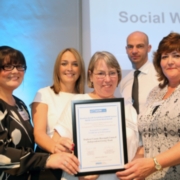Looking after the personal assistants: Torfaen Council launch their new personal assistant guide
For some people, everyday tasks can be difficult to achieve without assistance. It becomes necessary for them to find some extra support, and an increasing number of these people turn to personal assistants (PAs). These PAs are used through Local Authority Direct Payments, which is an alternative way of receiving care. Different to the more traditional agency care, this gives the person requiring assistance the opportunity to employ a PA of their choice; offering flexibility, choice and control. This is a great option for those who want to continue living independently, yet require a little bit of extra support to do so.
The role of a PA differs depending on the person they support and work for, but many of them do similar work to agency staff. However, access to training has typically been limited and, as such, is often inefficient to individuals with the demands of supporting people with a disability. In Torfaen, a number of people recognised how under-supported PAs were in our community. To combat this, we formed a collaboration that included a number of employees from Torfaen Council, Dr Neil Thompson, Connecting Learners, Unison, and Services for Independent Living to create a readily-available, accessible and useful resource that would help PAs feel secure and supported when coping with the difficult demands of their role.
Our self-imposed brief outlined that it needed to be accessible to as many people as possible and it was evident that the guide shouldn’t be classroom-based. In response, we produced an online training and awareness guide. Our objectives have definitely been achieved by this guide; it is available online around the clock, and it’s free for anybody who requires it to use.
The guide itself comprises of 5 different chapters, which focus on key areas that we believe are necessary for PA’s to know in order to do their job effectively:
- What’s it all about?
- Making sense of disability
- Protection from abuse
- Better safe than sorry: health and safety
- What next?
After each chapter, there is a conclusion, a ‘pause for thought’ section which asks the viewer to reflect, a number of links to extra information on specific topics, and a short quiz that tests what they have just learned. As well as these chapters, which cover everything from explaining what a PA does, to covering the legal requirements, the website also offers help on their rights as a worker and further help working with people who have specific disabilities. With all this useful information in one easy-to-navigate website, this guide is an excellent resource that equips PA’s with the training they require to perform well in their job. Even better, its accessibility means that it’s also a great reference point for PAs to use in order to refresh their knowledge, so it’s an ongoing learning tool.
However, it wasn’t easy to make this comprehensive, informative guide. With the team spread across Wales, communication and planning was difficult at times, yet we found we could manage the geographical issue by using Loomio, an online platform that makes it easier for groups of people to come together and make proactive decisions. Here, we were able to suggest ideas, discuss them, and then vote on each topic that was proposed, which made the process of creating this programme democratic and well thought out. We also had to accommodate for the visions of our key stakeholders, ensuring that they had a large amount of input into what the final product would be.
The team tested an early version of the guide with some PAs in the Torfaen area. We gathered feedback, which was constructive and overwhelmingly positive, that was used to make some small changes before we launched the programme in September 2015. It’s still early days but we expect that the quality of care offered by these PAs will vastly improve, to the satisfaction of both the PA and the person receiving the care, and any safeguarding issues in regard to the level of care being offered are highly likely to reduce.
The online training and awareness guide has already been extremely useful for the Torfaen community, as it gives PAs the proper support that they require for the first time. As a result, we expect that more disabled people in the community will be able to live independently for longer, both reducing their concerns and fears, as well as reducing the cost of care for the council.
To learn more about the project, visit http://pasonlineguidebook.blogspot.co.uk/
There is also a Welsh version: http://llawlyfrarleinargyfercp.blogspot.co.uk/


.png)



.png)